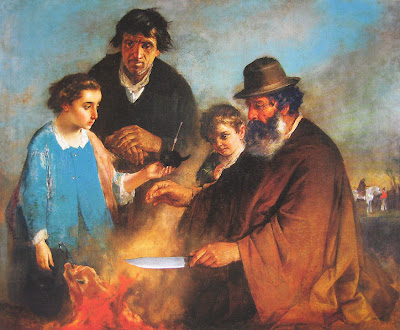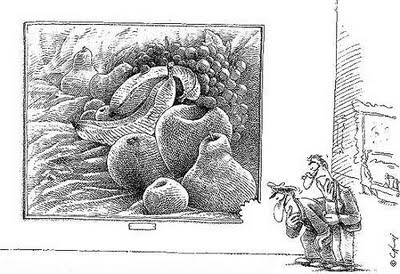False friends (
faux amis in French) are pairs of words or phrases from two different languages that look or sound similar, but differ in meaning.
Note that in the Spanish language...
América isn’t just the U.S.A. (esp.[= español] Estados Unidos).
AMÉRICA means the AMERICAN CONTINENT (i.e., THE AMERICAS).
Americano is not necessarily Yankee (esp. estadounidense o
yanqui).
AMERICANO is ANY PERSON FROM THE AMERICAS.
Anciano isn’t ancient (esp. antiguo).
ANCIANO means RESPECTABLE OLD PERSON.
Antes isn’t after (esp. después).
ANTES means BEFORE.
Aplicación isn’t application (esp. formulario).
APLICACIÓN means IMPLEMENTATION.
Arena isn’t any stadium (esp. estadio).
ARENA means SAND.
Un arma isn’t an arm (esp. brazo).
ARMA means WEAPON.

Bizarro isn’t strange (esp. extraño).
BIZARRO means BRAVE AND CORAGEOUS.
Boda isn’t body (esp. cuerpo).
BODA means WEDDING.
Cándido isn’t spontaneous (esp. espontáneo).
CÁNDIDO means INNOCENT AND NAIF.
Carácter isn’t character (esp. personaje).
CARÁCTER means TEMPERAMENT.
Carpeta isn’t carpet (esp. alfombra).
CARPETA means FOLDER.
Champiñón isn’t champion (esp. campeón).
Un CHAMPIÑÓN is a MUSHROOM.
Come isn’t to come (esp. venir).
COME is the 3rd person singular of the verb TO EAT.
Consistente isn’t consistent (esp. coherente).
CONSISTENTE means THICK AND STRONG.
Dinero is no dinner (esp. cena).
DINERO means MONEY.
Estar embarazada isn’t to be embarrassed (esp. estar avergonzada).
ESTAR EMBARAZADA means TO BE PREGNANT.
Extranjero isn’t stranger (esp. desconocido).
EXTRANJERO means FOREIGNER.
Éxito is no exit (esp. salida).
ÉXITO means SUCCESS.
Fábrica isn’t fabric (esp. tela).
FÁBRICA means FACTORY.
Farmacia isn’t farm (esp. granja).
FARMACIA means PHARMACY.
Gracioso isn’t gracious (esp. gentil).
GRACIOSO means AMUSING.
Grosería isn’t grocery (esp. mercancía).
GROSERÍA means A BAD WORD.
Idioma isn’t idiom (esp. modismo o espresión idiomática).
IDIOMA means LANGUAGE.
Librería isn’t library (esp. biblioteca).
LIBRERÍA means BOOKSHOP.
Ocurrencia isn’t occurrence (esp. aparición [de una palabra en un texto]).
OCURRENCIA is a WITTY REMARK.
Parientes aren’t parents (esp. padres).
PARIENTES are RELATIVES.
Policía is not policy (esp. política [respecto a algo o a alguien]).
POLICÍA means POLICE.
Precio is not prize (esp. premio)
PRECIO means PRICE.
Pretender is not to pretend (esp. fingir).
PRETENDER is TO INTEND TO DO SOMETHING.
Realizar isn’t to realize (esp. darse cuenta).
REALIZAR means TO ACCOMPLISH.
Ropa isn’t rope (esp. soga).
ROPA means CLOTHES.
Sensible isn’t sensible (esp. sensato).
SENSIBLE means SENSITIVE.
Obvious... But Wrong
by Gerald Erichsen
Asistir: Means to attend or to be present. Asisto a la oficina cada día, I go to the office daily. To say "to assist," use ayudar, to help.
Atender: Means to serve or to take care of, to attend to. If you're talking about attending a meeting or a class, use asistir.
Bizarro: Somebody whose way is brave, not necessarily strange. The English word "bizarre" is conveyed better by extraño or estrafalario.
Boda: If you go to a wedding or wedding reception, this is what you're going to. A body (as of a person or animal) is most often cuerpo or tronco.
Campo: Means a field or the country (in the sense of living in the country, not the city). If you're going camping, you'll probably be staying at a campamento or even a camping.
Carpeta: Although this can refer to a type of table cover, it doesn't have anything to do with carpets. It most often means a file folder (including the virtual kind) or a briefcase. "Carpet" is most often alfombra.
Compromiso: Meaning a promise, obligation, or commitment, it does not usually convey the sense that one have given up something to reach an agreement. There is no good noun equivalent of "compromise" that would be understood that way out of context, although the verb transigir conveys the sense of giving in to, yielding to, or tolerating another person.
Constiparse, constipación: In verb form, it means to catch a cold, while una constipación is one of the words that means a cold. Someone who is constipated is estreñido.
Contestar: It's a very common verb meaning to answer. To contest something, use contender.
Corresponder: Yes, it does mean to correspond, but only in the sense of to match. If you're talking about corresponding with someone, use a form of escribir con or mantener correspondencia.
Decepción, decepcionar: Means disappointment or to disappoint. To deceive someone is to engañar a alguién. Something deceptive is engañoso.
Delito: There's seldom much delightful about a crime. (Delito usually refers to a minor crime, as contrasted with a serious crime or crimen.) The feeling of delight can be a deleite, while the object that causes it an encanto or delicia (note that the latter word often has a sexual connotation).
Desgracia: In Spanish, this is little more than a mistake or misfortune. Something shameful is una vergüenza or una deshonra.
Despertar: This verb is usually used in the reflexive form, meaning to wake up (me despierto a las siete, I wake up at seven). If you're desperate, there's a true cognate you can use: desesperado.
Disgusto: Derived from the prefix dis- (meaning "not") and the root word gusto (meaning "pleasure"), this word refers simply to displeasure or misfortune. If you need to use a much stronger term akin to "disgust," use asco or repugnancia.
Destituido: Someone who has been removed from office is destituido. Someone without money is indigente or desamparado.
Éxito: It's a hit or a success. If you're looking for the way out, look for una salida.
Fábrica: That's a place where they fabricate items, namely a factory. Words for "cloth" include tejido and tela.
Fútbol: Unless in a context that indicates otherwise, this means soccer. If you want to refer to the popular U.S. spectator sport, use fútbol americano.
Fútil: This refers to something trivial or insignificant. If your efforts are futile, use ineficaz, vano or inútil.
Ganga: It's a bargain. Although ganga may be heard in Spanglish as a word for "gang," the usual word is pandilla.
Inconsecuente: This adjective refers to something that is contradictory. Something inconsequential is (among other possibilities) de poca importancia.
Introducir: This isn't truly a false cognate, for it can be translated as, among other things, to introduce in the sense of to bring in, to begin, to put, or to place. For example, se introdujo la ley en 1998, the law was introduced (put in effect) in 1998. But it's not the verb to use to introduce someone. Use presentar.
Largo: When referring to size, it means long. If it's big, it's also grande.
Minorista: Means retail (adjective) or retailer. A "minority" is una minoría.
Molestar: The verb doesn't have sexual connotations in Spanish, and it didn't originally in English either. It means simply to bother or to annoy. For the sexual meaning of "to molest" in English, use abusar sexualmente or some phrase that says more precisely what you mean.
Once: If you can count past ten, you know that once is the word for eleven. If something happens once, it happens una vez.
Pretender: The Spanish verb doesn't have anything to do with faking it, only to try. To pretend, use fingir or simular.
Realizar, realizacón: The verb can be used flexibly to indicate something becoming real or becoming completed: Se realizó el rascacielos, the skyscraper was built. To realize as a mental event can be translated using darse cuenta ("to realize"), comprender ("to understand") or saber ("to know"), among other possibilities, depending on the context.
Recordar: Means to remember or to remind. The verb to use when recording something depends on what you're recording. Possibilities include anotar or tomar nota for writing something down, or grabar for making an audio or video recording.
Ropa: Clothing, not rope. Rope is cuerda or soga.
Revolver: As its form suggests, this is a verb, in this case meaning to turn over, to revolve, or otherwise to cause disorder. The Spanish word for "revolver" is close, however: revólver.
Embarazada: It might be embarrassing to be pregnant, but it isn't necessarily. Someone who feels embarrassed tiene vergüenza or se siente avergonzado.
Emocionante: Used to decribe something that's thrilling or emotionally moving. To say "emotional," the cognate emocional will often do fine.
En absoluto: This phrase means the opposite of what you think it might, meaning not at all or absolutely not. To say "absolutely," use the true cognate totalmente or completamente.
Sano: Someone who is sane is en su juicio or "in his right mind."
Sensible: Usually means sensitive or capable of feeling. A sensible person or idea can be referred to as sensato or razonable.
Sensiblemente: Usually means "perceptibly" or "appreciably," sometimes "painfully." A good synonym for "sensibly" is sesudamente.
Sopa: Soup, not soap. Soap is jabón.
Suceso: Merely an event or happening, sometimes a crime. A success is un éxito.
Tuna: Order this at a desert restaurant and you'll get edible cactus. The fish is atún (
False Friends often Lead to Mistakes).
















































